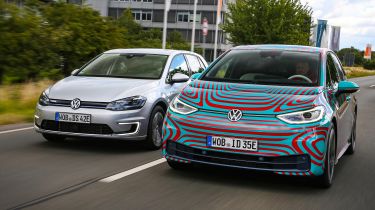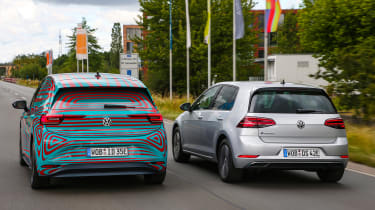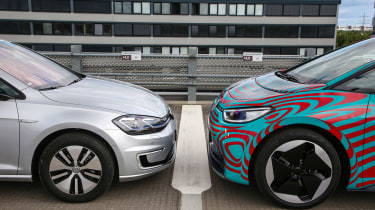Volkswagen ID.3 vs Volkswagen e-Golf
We compare the new Volkswagen ID.3 to the e-Golf to see how far electric tech has come
If you’re still one of those who doubts the future of electric mobility, then the forthcoming Volkswagen ID.3 hatchback should be enough to push you over the line.
That’s our conclusion after a short drive in a prototype of the new model around Wolfsburg recently. And just to confirm this opinion, we brought along a current e-Golf to help size up the first offering from VW’s pure-electric ID. sub-brand.
• Best electric cars on sale right now
To recap, the new ID.3 will be offered with a choice of three battery sizes, giving 205, 261 or 342 miles of range. And the entry point of the line-up should start from around £26,000 or less.
We begin our assessment by revisiting the current VW pure-electric hatch – but the e-Golf already feels like it’s old tech. While it serves a purpose, with a range of 144 miles and a price tag of £30,000, this really is a hard car to recommend these days.
But the Mk7.5 e-Golf won’t be replaced; instead VW will point you towards the ID.3. That feels appropriate; after a short spin in the Golf and a jump into the back to test rear legroom, we feel ready to move on, and the ID.3 is a very different experience.
Used - available now

2018 Mazda
6 Saloon
26,134 milesManualPetrol2.0L
Cash £14,063
2020 MINI
Countryman
31,160 milesAutomaticDiesel2.0L
Cash £16,587
2018 BMW
X5
48,752 milesAutomaticDiesel3.0L
Cash £24,606
2020 Volvo
XC60
53,700 milesAutomaticPetrol2.0L
Cash £20,406VW will reveal the final car at September’s Frankfurt Motor Show, but we already know a lot about it. The ID.3 is one centimetre shorter than a Golf, at 4.26 metres, but two centimetres wider and, thanks to the batteries under the floor, a full 17cm taller.
Inside, the ID.3’s boot capacity is 390 litres – only 10 litres more than the Golf’s – but more significantly the wheelbase is 14cm longer. The Golf has never been a small car inside, but the ID.3 allows you to sit like you’re in a Skoda Superb; rear-seat occupants have space to cross their legs.
The ID.3’s facia is covered up. But we’ve had a peek and can tell you that the steering wheel has multifunction buttons, and there’s a small ‘pod’ display showing speed, battery levels and the selected gear. To the right of this is a toggle, similar to what you’ll find in a BMW i3, which you push forward for drive and pull back for reverse.
VW has learned from Tesla for the ID.3’s start procedure, so you don’t turn it on or off. You just unlock it, climb in, select ‘D’ on the gear toggle and drive off. And when you get to your destination, press ‘P’ for the parking brake, climb out, lock it and you’re done.
On the road, a few things stand out. The first is the turning circle, which feels small for a family-size hatchback; this has been made possible, we suspect, by the fact that the ID.3 is rear-wheel drive. The body control and agility are strong points, too, helped no doubt by a lower centre of gravity.
Performance is more than adequate; the car we’re driving has a higher output than the entry-level car, so 201bhp and 310Nm of torque, and we enjoy exploiting the instant response on Wolfsburg’s streets. Such behaviour would cripple battery range in the e-Golf, but based on our short drive, the ID.3’s range actually seems achievable.
Whether the ID.3 is really an electric car for the masses is perhaps questionable. But up to now, e-mobility has generally been the domain of the wealthy, thanks to Tesla, Jaguar and Audi. In that context, the ID.3 is a capable electric family car that costs the same as a well specced Golf diesel. Finally, E is within reach.
Stay up to date with the latest Volkswagen ID.3 news with our dedicated page









